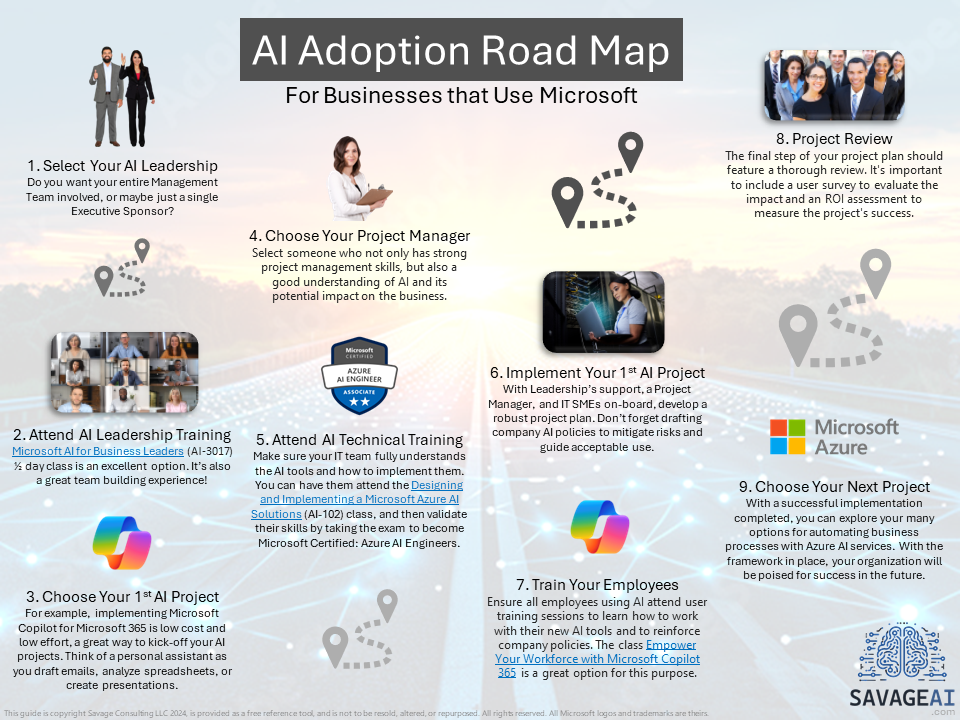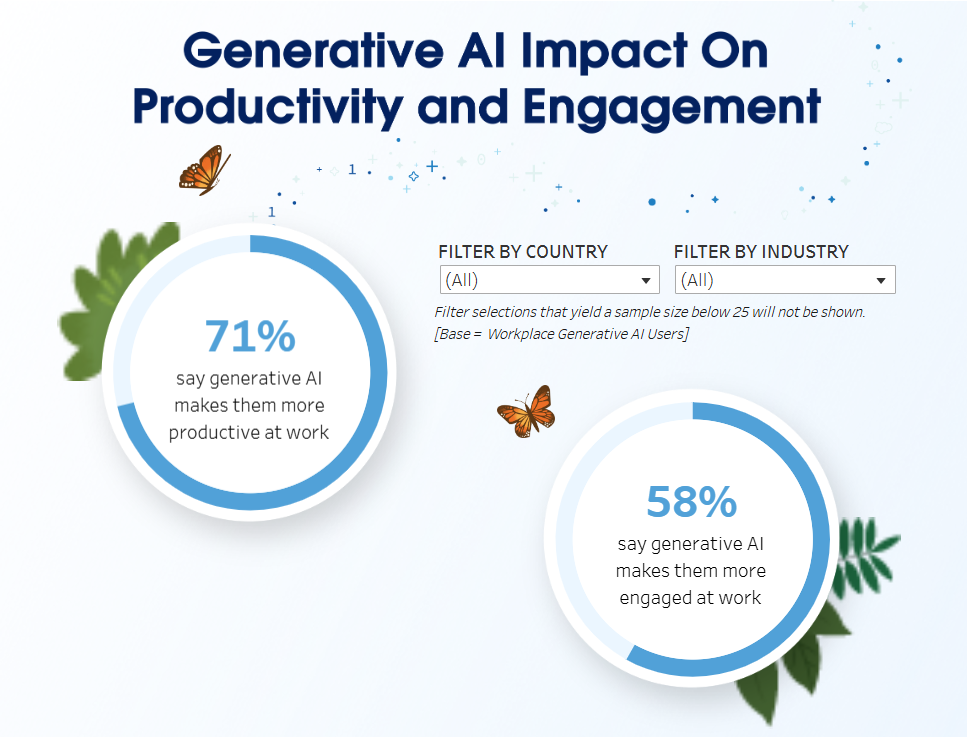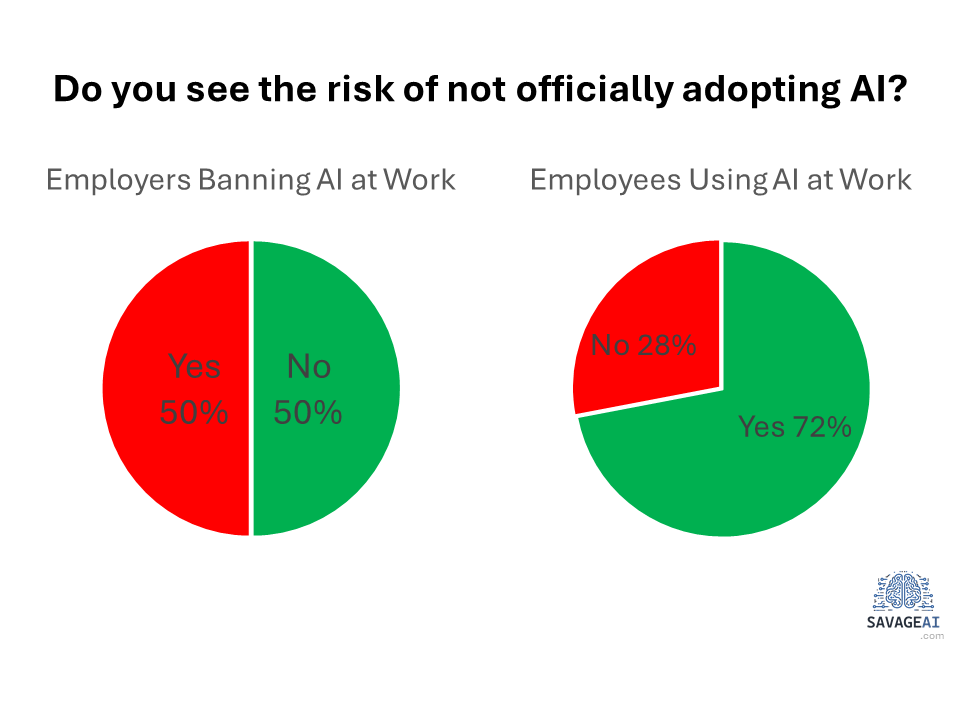Be in the know: AI News & Free Articles
Your source for AI news and training options for your team!
Welcome to your ultimate source for cutting-edge AI insights! Dive into the world of Microsoft AI, where you’ll discover the latest advancements in Azure and Copilot. Stay informed about groundbreaking technologies like ChatGPT, Google Gemini, Apple Intelligence, and Meta AI.
Explore the transformative power of customized chatbots, the revolutionary impact of AI in healthcare, and the innovative strides in AI-driven robotics. Learn about AWS Trainium, Amazon’s custom AI chip designed for deep learning, and NVIDIA’s AI tools like Chat with RTX and NVIDIA Omniverse. Don’t miss out on xAI Grok, Elon Musk’s conversational AI designed for both serious and casual discussions.
Join us as we navigate the future of artificial intelligence and its profound influence on our world and how we get work done. We will also focus on skills training that helps individuals, businesses, and organizations make practical use of these tools in a responsible way.
-
✴︎
2025 is the Year to Adopt AI
As we approach 2025, the rapid advancements in artificial intelligence (AI) are poised to transform the business landscape like never before. From enhancing productivity to driving innovation, AI is set to play a pivotal role in shaping the future of business. Read on to discover how you can stay ahead of the curve and prepare for the exciting changes ahead.
Understand the Advancement of AI Tools
The Advancement of AI Tools Since the 1950s Artificial Intelligence (AI) has transformed the business landscape over the decades, driving efficiency, innovation, and competitive advantage. Let’s explore the key milestones in AI’s evolution and how they have impacted the business world.
Artificial Intelligence (1950s): The journey began in the 1950s when machines were first created to perform tasks that previously only humans could do. Often thought of as “computing,” this era actually marked the birth of AI, laying the foundation for future innovations that would revolutionize industries.
Machine Learning (1990s): Forty years later, in the 1990s, Machine Learning emerged. Computers gained the ability to learn from past data to predict future outcomes, enabling businesses to make data-driven decisions, optimize operations, and improve customer experiences.
Deep Learning (2010s): Fast forward another 20 years to the 2010s, and we saw the rise of Deep Learning. Neural networks, designed to mimic the human brain, began analyzing data and making decisions with unprecedented accuracy. This breakthrough allowed businesses to leverage advanced analytics, enhance automation, and develop sophisticated AI-driven solutions.
Generative AI (2020s): The pace of innovation continued to accelerate, and by the 2020s, Generative AI emerged. This technology allows AI to create new text, images, or sounds based on input, opening new possibilities for content creation, personalized marketing, and customer engagement.
2025: The Next Frontier: Following this pattern of exponential progress—40 years, 20 years, 10 years, and now 5 years—we can logically anticipate new advancements by 2025. Businesses must stay ahead of the curve, ready to embrace the next wave of AI innovations that will drive further growth and transformation.
As we reflect on these milestones, it’s clear that each advancement has built upon the previous one, leading to increasingly sophisticated and capable technologies. The rapid pace of innovation suggests that the next breakthrough is just around the corner, and businesses must be prepared to leverage these advancements to maintain a competitive edge.
What You Can Expect in 2025
As we look ahead to 2025, the landscape of AI in business is set to evolve even further. Companies are increasingly adopting AI tools to boost efficiency and productivity, integrating advanced technologies into their daily operations. AI-powered personal assistants will become more sophisticated, understanding user needs, managing schedules, and providing real-time assistance with greater accuracy.
AI-driven business processes will continue to transform how organizations operate. AI systems will analyze vast amounts of data to offer valuable insights and optimize business operations, enabling companies to make more informed decisions and stay competitive in a rapidly changing market.
Moreover, the importance of AI ethics and governance will be paramount. Ensuring transparency, fairness, and accountability in AI systems will be crucial for building trust and achieving positive outcomes. Businesses will need to prioritize ethical considerations and implement robust governance frameworks to navigate the complexities of AI deployment responsibly.
As we prepare for these advancements, it’s clear that AI will play an increasingly integral role in shaping the future of business. The rapid pace of innovation suggests that the next breakthrough is just around the corner, and companies must be ready to embrace these changes to maintain a competitive edge.
“In 2025, we can expect more companies to adopt AI, along with AI-powered personal assistants and AI-driven business processes. There will also be a strong focus on AI ethics and governance.” – Steve Savage, CEO & Founder, SAVAGE AI
Microsoft AI Solutions Ready to Launch
Many businesses are hesitant to adopt AI because they don’t fully understand the technology, its impact, or the required policies. However, what they may not realize is that Microsoft, a trusted partner for most businesses worldwide, has been a behind-the-scenes innovator of these technologies. Microsoft is not only committed to responsible AI but also integrates these AI technologies into their well-known products, making it easier for businesses to implement and benefit from AI.
Microsoft offers a range of integrated tools to help you implement responsible AI in your organization. One such tool is Copilot, a generative AI tool that is seamlessly integrated into Windows and your favorite Office apps, such as Outlook, Word, Excel, and PowerPoint. Copilot enhances productivity by assisting with tasks like drafting emails, creating documents, analyzing data, and designing presentations, all while ensuring that AI is used responsibly and ethically.
In addition to Copilot, Azure AI services can significantly enhance your business processes. These services include natural language processing, document intelligence, computer vision, and speech recognition. By leveraging Azure AI, businesses can automate routine tasks, gain valuable insights from data, improve customer interactions, and streamline operations.
Microsoft’s commitment to responsible AI is evident in their focus on AI ethics and governance. They ensure transparency, fairness, and accountability in their AI systems, building trust and achieving positive outcomes for businesses and their customers. By adopting Microsoft’s AI solutions, businesses can stay ahead of the curve, ready to embrace the next wave of AI innovations while maintaining a competitive edge.
As we look forward to 2025, it’s clear that AI will play an increasingly integral role in shaping the future of business. With Microsoft’s AI solutions, you can confidently navigate this evolving landscape, leveraging advanced technologies to drive growth and transformation in your organization.
Training Needed for 3 Key Audiences
As AI continues to revolutionize the business landscape, it’s crucial to ensure that all stakeholders are adequately trained to harness its potential. Effective training is essential for maximizing the benefits of AI while mitigating risks and ensuring responsible use. Here are the three key audiences that need targeted training:
Business Leaders: Business leaders need to understand the potential benefits of AI, how to mitigate the risks, and how it can be effectively integrated into their business operations. This includes learning about AI’s impact on strategic decision-making, improving operational efficiency, and enhancing customer experiences. By gaining a comprehensive understanding of AI, business leaders can drive innovation and maintain a competitive edge in their respective industries.
IT Professionals: IT professionals need to be trained in the technical aspects of AI, including how to develop, deploy, and maintain AI systems. This involves acquiring skills in machine learning, data analysis, and AI infrastructure management. Proper training ensures that IT teams can effectively implement AI solutions, troubleshoot issues, and optimize performance, thereby supporting the organization’s AI initiatives.
Everyone: Everyone within the organization needs to be trained in how to effectively and safely use these innovative AI tools. This includes understanding the ethical considerations, data privacy, and security implications of AI. By fostering a culture of responsible AI use, organizations can ensure that all employees are equipped to leverage AI technologies in their daily tasks, enhancing productivity and collaboration.
To help you navigate this journey, we invite you to download our free “AI Adoption Roadmap.” This comprehensive guide provides valuable insights and practical steps for successfully integrating AI into your organization, ensuring that you are well-prepared for the future of work.
Unlock the Future of Your Business with AI
As we stand on the brink of the next wave of AI advancements, it’s clear that 2025 is going to be a pivotal year for businesses. By understanding the advancements in AI, recognizing the importance of targeted training, and leveraging Microsoft’s AI solutions, your organization can stay ahead of the curve and drive innovation.
Don’t miss out on the opportunity to revolutionize your business operations and enhance productivity. Schedule a free 15-minute discovery call with our experts today to explore how AI can benefit your organization and to receive personalized guidance on implementing AI solutions responsibly and effectively.
Take the first step towards a smarter, more efficient future. Schedule your discovery call now!
-
✴︎
Two Employee Surveys Reveal Insights on AI in the Workplace
In recent years, the integration of Artificial Intelligence (AI) in the workplace has become a hot topic. Two recent surveys, one by Salesforce and another by Randstad, shed light on how employees really view AI in the workplace. These surveys reveal that employees are not only eager to use AI but also recognize the need for proper training and official adoption to address security, privacy, and ethical concerns.
Image Source: Salesforce According to the Salesforce survey, a significant percentage of employees are already leveraging AI tools to enhance their productivity and efficiency. The survey reveals that 76% of employees believe that AI has improved their job performance, and 67% feel that AI has made their work more enjoyable. However, the survey also highlights concerns about data privacy and security, with 58% of employees worried about the misuse of their personal information
The Randstad Workmonitor 2024 survey echoes these findings, showing that 72% of employees are using AI tools in their daily tasks. The survey also points out that 64% of employees feel that their employers are not doing enough to address the ethical implications of AI. This gap in official AI adoption poses a risk to both employees and organizations, as unregulated AI use can lead to data breaches, privacy violations, and ethical dilemmas.
More than 50% of employers ban AI, yet over 72% of employees report using AI. Do you see the risk of not official adopting AI?
Interestingly, both surveys reveal that a significant number of employers are not officially allowing the use of AI tools. The Salesforce report indicates that more than 50% of employees are using AI without proper training or official approval from their employers.
This contrast raises an important question: How is it possible that over 70% of employees are utilizing AI at work while more than 50% of employers do not officially permit its use? The answer lies in the use of personal devices. Employees are accessing AI tools on their own devices to enhance their work, but this practice poses significant risks. Without official adoption and proper training, employees may inadvertently share company data with unregulated AI tools, leading to potential data breaches and privacy violations.
Moreover, there is a common misconception that employees are afraid AI will make them lose their jobs. This fear has paralyzed many employers, making them hesitant to embrace AI tools. However, the data from these surveys paints a different picture. The Randstad survey shows that 68% of employees are eager to use AI to enhance their work. This indicates that employees are not only ready to embrace AI but are also looking forward to the benefits it can bring to their roles.
68% of employees are eager to use AI to enhance their work
To mitigate these risks and harness the potential of AI, it is crucial for companies to adopt AI officially and implement robust policies that prioritize security, privacy, and ethics. One effective approach is to provide comprehensive training to three key audiences: leadership, technical teams, and employees.
Leadership training should focus on understanding the strategic importance of AI and its potential impact on the organization. Technical teams need in-depth training on AI technologies, data security, and privacy measures to develop and maintain secure AI systems. Employees should be educated on the ethical use of AI, data privacy, and security best practices to empower them to use AI tools responsibly.
In conclusion, while employees are already embracing AI in the workplace, it is imperative for companies to officially adopt AI with a focus on security, privacy, and ethics. By providing targeted training to leadership, technical teams, and employees, organizations can harness the full potential of AI while safeguarding their workforce and data.
SAVAGE AI provides AI classes tailored for three distinct audiences, which can be viewed on their website. These live instructor-led training sessions are designed to equip teams with the skills necessary to implement AI applications swiftly and efficiently.
References:
See more articles…
Or browse by category…
- Free Articles (10)
- News (6)




